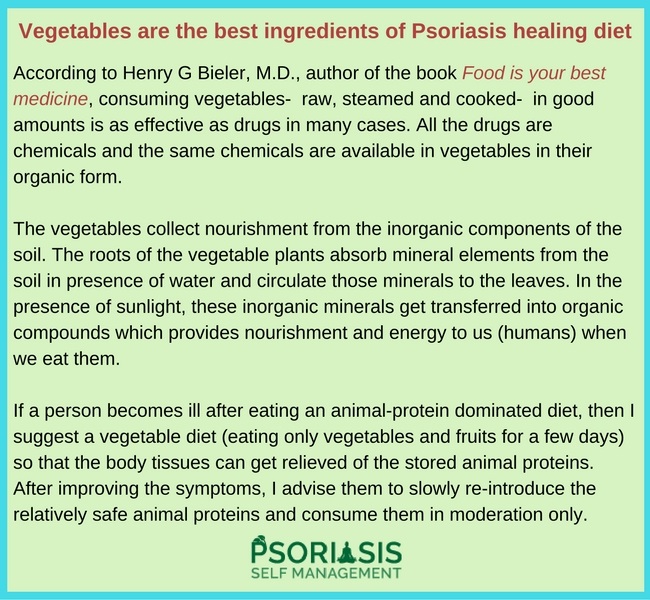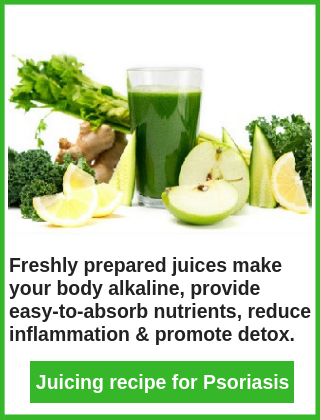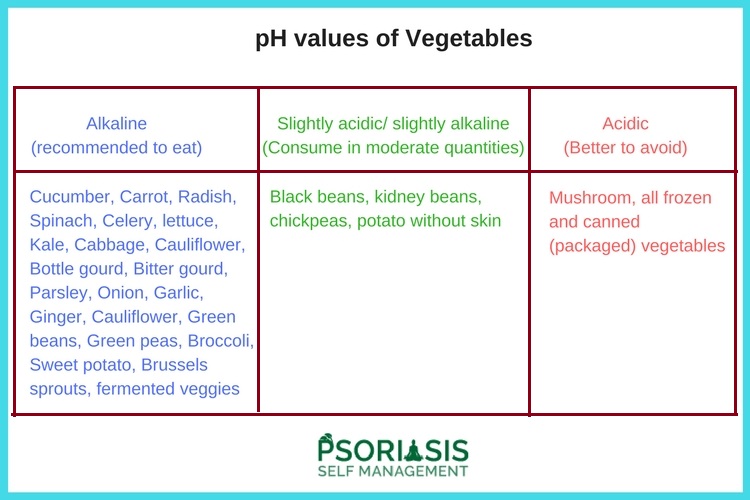Vegetables are the best component of a psoriasis healing diet. You can consume them in different forms- raw, steamed, cooked and fresh juices extracted from them. Vegetables, when consumed in good amounts, can provide you all the vitamins, minerals and anti-oxidants that would help you relieve inflammation, improve the digestive health and heal your gut naturally. The best thing is- nutrients provided by vegetables are easy to absorb and provide nutrition without putting extra burden on the digestive organs.
According to Dr John Pagano, author of the book Healing Psoriasis: The Natural Alternative, fresh vegetables (and fruits) should make up the 80% of your diet. Remaining 20% can include grains and animal proteins. It would help to maintain the optimum acid-alkaline balance.
Looking for Alkaline foods? Consume a lot of vegetables…
Almost all the vegetables are alkaline in nature. When our system becomes burdened with acidic body toxins due to over-consumption of sweets, starches and proteins- we must return to the vegetables (most of the vegetables are alkaline forming) to emulsify, neutralize and eliminate these accumulated toxins.
Human body metabolism is designed to work best under slightly alkaline conditions- optimum body pH is 7.35 to 7.45. If this vital body pH balance shifts towards acidic zone, it makes a perfect recipe to trigger any auto-immune disorder, including psoriasis.
Deteriorating effects of hyper-acidic body pH
- Compromises the immune system because the disease causing microbes enjoy warm, acidic pH environment. They grow and proliferate in such an encouraging environment to damage body tissues and organs. Candida (yeast overgrowth) is also linked to chronic acidic body pH.
- Reduces the level of oxygen in blood cells. Less oxygen means less energy, fatigue, impure blood and disturbed immune system.
- Hampers the digestion process by affecting the functioning of digestive enzymes. Also, it impairs the body’s natural ability to absorb nutrients and minerals from the food we eat.
- Encourages accumulation of body wastes in the gut. The unhealthy microbes would feed on these body toxins, rot them and irritates the intestinal walls to worsen leaky gut symptoms.
- Chronic acidic body pH depletes the body’s natural reserves of alkaline minerals such as calcium, potassium, sodium and magnesium in your hairs, nails, teeth and bones to weaken them.
Unfortunately, most of the food stuffs and beverages that we consume are acid forming- grains, white rice, bread, sugar, refined white flour, junk foods, bakeries, processed/ packaged foods, tea, coffee, soda, carbonated drinks, eggs and some meats. Apart from the diet, chronic stress, lack of physical activity, over-consumption of alcohol and antibiotics are other major factors to make your body acidic.
Including permitted vegetables in liberal amounts in your diet can help greatly to re-establish the optimum acid-alkaline balance of the body to sort out the inner matters and improve your psoriasis naturally.
- Most of the vegetables (green leafy, roots, plant based) are alkaline. Dark green vegetables are highly alkaline in nature.
- Drinking vegetable juices is one of the best ways to make your body alkaline.
- The fermented vegetables- coconut kefir, kimchi, sauerkraut- are also awesome; they provide healthy bacteria, helps to maintain the gut pH and supports a healthy immune system.
Green leafy vegetables are rich in chlorophyll
All the green colored vegetables, especially the green leafy vegetables are rich in chlorophyll- a type of plant pigment that is responsible for the green color of the vegetables. Chlorophyll is amazing- it makes your body alkaline; oxygenates your body cells and binds with the heavy metals (from pesticides and contaminated water), free radicals and other toxins in your body and neutralize them. Chlorophyll inhibits the growth of Candida albicans (Yeast overgrowth) as well. Chlorophyll supplements are used in alternative healing to treat liver impairment and cancer. The darker green the vegetable, the more chlorophyll it contains. Hence, include a lot of green veggies, particularly the green leafy vegetables to infuse your body with this healing plant chemical.
According to Edgar Cayce, a pioneer in the world of holistic healing, green leafy vegetables (romaine lettuce, kale, spinach, mustard green and turnip greens) are blood purifiers. Hence, people dealing with skin disorders should consume them in good amounts as most of the skin disorders are linked to impurity in blood.
Avoid Nightshade vegetables
Stay away from nightshade vegetables to make peace with psoriasis and psoriatic arthritis. The nightshade vegetables include tomato, white potato, eggplant (brinjal) and peppers (cayenne pepper, chili pepper, capsicum, paprika).
I have already discussed in detail about the potential harms of nightshade vegetables for psoriasis. These foodstuffs come under the category of food allergens and can increase inflammation, joint pain and worsen leaky gut.
What about starchy vegetables?
If you have a sensitive gut; if you regularly suffer from gas, bloating, indigestion, constipation and acidity- then try to limit the consumption of starchy vegetables.
Why so? Let’s dig down and reveal this mystery!
- Starches are considered as complex carbohydrates. It takes a bit effort to break down these complex carbohydrates into simpler sugar molecules at the time of digestion. Hence, if your digestive health is already compromised, then better to limit the consumption of starchy foods.
- Also, starch is the food for yeast overgrowth and bad microbes in your gut. Hence, over-consumption of starchy foods can further disturb the gut flora to irritate the gut linings and worsen leaky gut, Candida and hence, psoriasis symptoms.
The psoriasis healing diet also recommends limiting the consumption of starchy foods that include grains, beans, legumes and starchy vegetables.
Starchy foods include:
Grains– Bread, pasta, cereals, rice, different grains
Beans and legumes– Kidney beans, chickpeas, pinto beans, lentils and other types of dried beans
Starchy vegetables– Peas, corn, white potato, sweet potato, pumpkin
Among various starchy vegetables, I’ve a soft corner for sweet potatoes- rich in fibers, rich in potassium, low in calories, gluten free- for me, sweet potato is a fairly innocent starchy vegetable and can be consumed without much worries.
List of non-starchy vegetables include- beetroot, onion, cauliflower, cabbage, broccoli, celery, cucumber, lettuce, garlic, Brussels sprouts, spinach, carrot, kale, turnip greens, parsley, artichoke, beans, radish and parsley.
Raw vegetables vs Steamed (or cooked) vegetables
Raw vegetables provide more roughage (fiber), promote smooth bowel movements and have a cleansing effect. But, a major portion of raw vegetables goes undigested. Hence, they don’t feed us. Rather, raw vegetables can aggravate the accumulation of body wastes (undigested food) if you have a poor digestive health.
On the other hand, steaming (or cooking) breaks down the cellular structure of vegetables to make them readily digested and hence, they provide nourishment rather than cleansing action.
My take- raw vegetables should be consumed only in the form of salads and juices. Otherwise, steamed (or lightly cooked) vegetables are the better choices.
How to eat salads
Fresh green leafy vegetable salads make up an important part of psoriasis healing diet. Green leafy vegetables emulsify the accumulated toxins, provide nutrition and relieves the congested liver. When it comes to salad dressings, use olive oil, lemon juice, Himalayan pink salt, low-fat yogurt and apple cider vinegar. Use one or more of these ingredients as per your taste and convenience. Personally, I add lemon juice and a pinch of pink salt. Sometimes, I add yogurt along with a pinch of salt. Among different types of vinegars, only apple cider vinegar is allowed. Avoid commercially available salad dressings as they may contain artificial preservatives.
Don’t forget to wash the vegetables thoroughly before using to minimize the risk of exposure to pesticides and other contamination.
Are Vegetables and Fruits equally good?
In general, we always discuss about fruits and vegetables together. We always suggest to eat more of fruits and vegetables and their juices. But, fruits have certain limitations in comparison to vegetables:
- Fruits are less compatible with other foods like grains, cereals, legumes, dairy and animal proteins (fish, meat, eggs). They are better consumed alone. On the other hand, vegetables are very much compatible with a variety of food stuffs.
- Certain citrus fruits and berries can cause allergic reactions to some psoriatic people and worsen their symptoms. This doesn’t imply to vegetables- except the nightshades.
- Too many fruits can provide a lot of fructose to your body. Fructose is a simple sugar which is largely metabolized by the liver only. Hence, consuming a lot of fruits and fruit juices can just overload the already impaired liver and congest it. No such danger exists in case of vegetable. That’s why vegetable juice fasting is so much popular among the naturopaths. Drink as much vegetable juice as you wish and eat as many vegetables as you want to.
I highly recommend vegetables to be consumed in every meal. Drink fresh vegetable juices at the breakfast and enjoy steamed/lightly cooked vegetables in lunch and dinner. For example, green vegetable salad and steamed or cooked vegetables along with breads or legumes.
References
https://www.ncbi.nlm.nih.gov/pubmed/15550456
https://www.ncbi.nlm.nih.gov/pmc/articles/PMC3649719/
https://www.ncbi.nlm.nih.gov/pmc/articles/PMC3419346/
https://www.ncbi.nlm.nih.gov/pmc/articles/PMC3583891/



